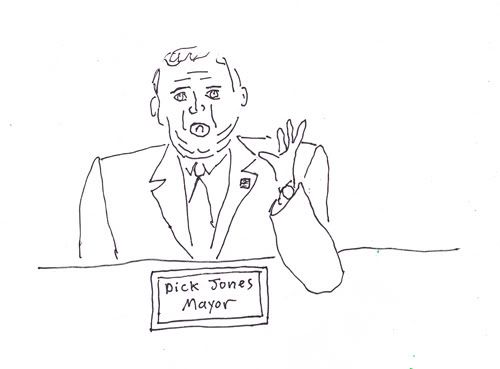Fullerton, California was incorporated as a city in 1904. It was governed by a newly-formed body called the “City Trustees” and one Mayor, who were elected by the people. These trustees and mayor were largely white, wealthy landowners and businessmen. The first mayor of Fullerton was Charles C. Chapman, the richest man in town. From the very beginning, the political system in Fullerton favored wealthy, white landowners and businessmen.
Around the middle of the century, Fullerton’s political structure changed to a “council-manager” system, and it remains so today. The city is governed by five elected City Council members, and one appointed City Manager. There is a mayor, but that is larely an empty ceremonial title, as his vote counts the same as the other council members. The Council Members meet twice a month and receive a small stipend. The City Manager works full-time and is well-paid. Because he is not elected, he is not answerable to the people.
Describing this trend, local historian Spencer Olin writes, “By the mid-1960s, then, several marked changes in political structures and practices had occurred that clearly favored the interests of a certain class segment, first of regional capitalists and next of owners of national and international corporations…an increased depoliticization of the municipal administration had taken place through the imposition of the council-manager system and the move away from elected officials toward appointed ones.”
Most City positions are now appointed, not elected: the police Chief, the Planning Commission, the City Manager. These people do not have to answer to the public they serve. This system, of course, has consequences. If city officials are not answerable to the public, the chance for corruption increases, as we have seen with the current Fullerton Police Department, and the Kelly Thomas police brutality issue.
Olin continues: “If we carefully analyze the political forces behind such changes in municipal (city) government, while at the same time paying attention to underlying economic developments, we can uncover the antidemocratic implications of suburban policies…We can see, for example, that important areas of public authority were removed from the control of locally elected officials and were taken over by relatively autonomous and distant governmental agencies largely insulated from the political process.”
A good example of this is the Fullerton Planning Commission. Members of the Planning Commission are not elected, they are appointed. Thus, there is no limit to the amount of money and favors they may receive from developers or corporate interests who want them to “approve” their projects. While it is true that planning commission meetings are often open to the public, members of the commission have no obligation or incentive to actually listen to the public.
This anti-democratic system clearly favors corporate and developer interests, and allows them to “move directly into the inner circles of government, and once there to dominate more effectively than ever before municipal affairs” (Olin 234). I have seen this first-hand in Fullerton, with the Coyote Hills issue. The Chevron Corporation, who owns West Coyote Hills, is deeply involved in the Fullerton political process, employing lawyers, experts, and public relations folks to give them access to Council Members and the planning commission. These, and other, corporate-government relations go on largely outside the sphere of public debate and scrutiny.
When I began to attend City Council meetings around 2009, I was struck by the arrogant and dismissive way in which certain members of Fullerton City Council treated anyone from the public who voiced any kind of dissent. For a long time, I thought: “Well, those guys are just assholes.” But now I see them as part of a larger system, a system of corporate-government pacts, a system that alienates and excludes the average citizen.
Having said that, I think things are changing. The recent Kelly Thomas police brutality issue has put the formerly-insulated Fullerton City Council directly in the public spotlight. In a way, I feel bad for these guys. They are dealing with something completely new and foreign to them…democracy.

